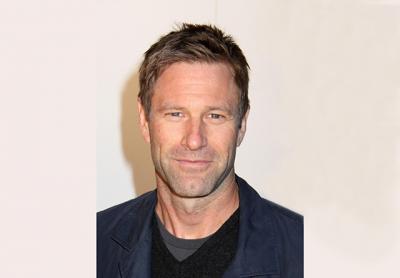Aaron Eckhart: Reflecting On an Eclectic Career

Given everywhere that Aaron Eckhart has lived, it is surprising his visit this week to the Hamptons International Film Festival will be the first time he has been on the South Fork.
“I lived in New York for years, but I never got out there. I wasn’t tuned in, but I know it’s beautiful.”
While he may not have firsthand knowledge of the place, it hasn’t stopped him from being inspired by it creatively. “I want to film Edward Albee’s ‘Who’s Afraid of Virginia Woolf?’ on the beach there,” he said on the phone from his Montana ranch last week. He said he liked the idea of a couple in a “crazy let-it-all-out relationship” airing their grievances in this pristine, but not always civilized, setting.
Mr. Eckhart will be interviewed tomorrow at 1 p.m. at Guild Hall as part of the film festival’s “A Conversation With” series. He is also promoting “Bleed for This,” a film by Ben Younger. In it, Mr. Eckhart plays Kevin Rooney, a boxing trainer for Vinny Pazienza, portrayed by Miles Teller. Mr. Pazienza won two world title fights before breaking his neck in a car accident. The film is the story of Mr. Pazienza’s determination to continue fighting after being told he had to quit for his own safety.
It is the second real-life character Mr. Eckhart has played in movies released this year. He also took on the role of Chesley (Sully) Sullenberg’s co-pilot Jeff Skiles in Clint Eastwood’s film “Sully,” now in theaters.
He said acting as a real as opposed to fictional character isn’t that much different. “A subset of acting is truthfulness. I strive to be truthful in everything I do.”
Although he never got to meet Mr. Rooney, who was ill during the filming, he worked from research and media to build the character of the former boxer, who may be best known for training Mike Tyson in his early career.
Mr. Eckhart said he has been boxing since his role in “Erin Brockovich.” “I thought I had to learn a skill to get in shape. Every day, I still do something in regards to boxing.”
“It’s a movie about family and love, and not letting anybody tell you what not to do. He was down and out and told not to fight again, but he recovered with a broken neck and won a title.”
In the film “Sully,” he said, he let Tom Hanks’s “subtlety and understatedness . . . steer the car.” He said he had always wanted to work with him, “one of the greatest actors in some of the greatest films. You can’t see a box of chocolates and not think of Tom Hanks.” He added that working out on the Hudson to re-create the scene of the crash was intense. “We felt the love of the story from all of the people we were working with,” including some of the first responders acting as consultants.
In the two films, his characters are very different, but it was also the directors’ styles that made each experience unique.
Mr. Younger, whose previous credits include “Boiler Room” and “Prime,” is “hungry for greatness. He was always pushing us to be better than we can be.”
Although he had always admired Mr. Eastwood and considered him an icon in the film industry, he said working with him was more relaxed. “Clint is very settled in his directing. He surrounds himself with a group that is like a family, people who have worked with him for five to 10 movies, and everyone calls him boss.”
Like most actors, Mr. Eckhart has had an eclectic career, and one in which he has alternated between leading men and supporting roles in small and huge films. “I’ve had an interesting career. I’ve tried different genres. I’ve played the game and gone against the grain,” he said. In recent years, “I’ve come to grips with the fact that I am what I am. I can’t control my career.”
“Now, it’s an adventure. I wake up and say, ‘Hey, where is today going to take me?’ I decided to go to Korea and Mexico at 12 o’clock last night.”
He has also decided to try writing and directing his own film. “Even in my early career there was a frustration about saying someone else’s words.” He said he envied auteurs like John Cassavetes, who, like Mr. Albee, created “some great relationships on film, so raw and real.”
At some point, “you have to decide how to be happy even if you have success. I realized I have to say it in my own way. I want to get what’s inside of me down in film. When you’re younger you try to be a star and be in big films and earn money. You want to be Marlon Brando. Eventually you get back to what really matters to you.”
